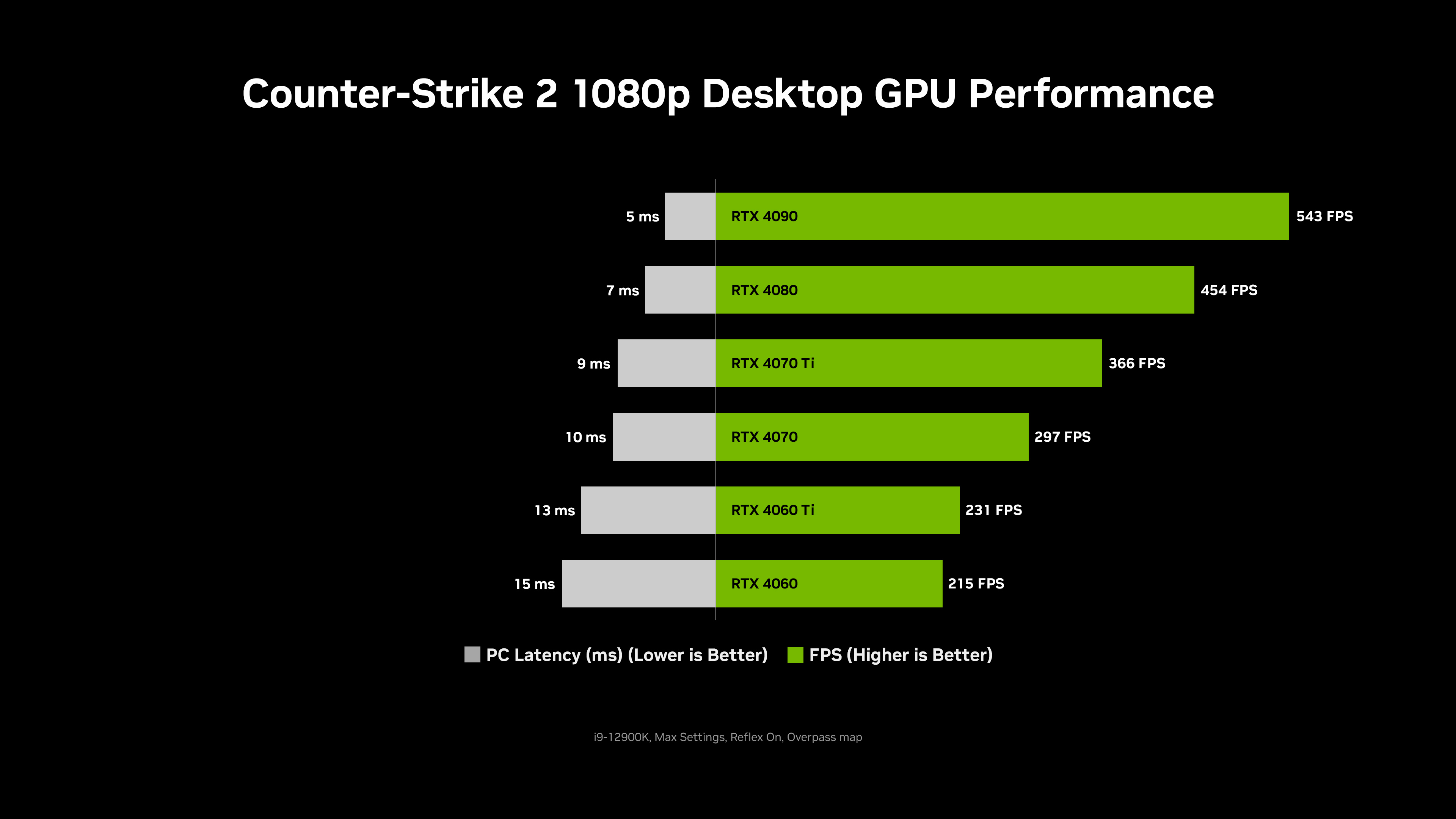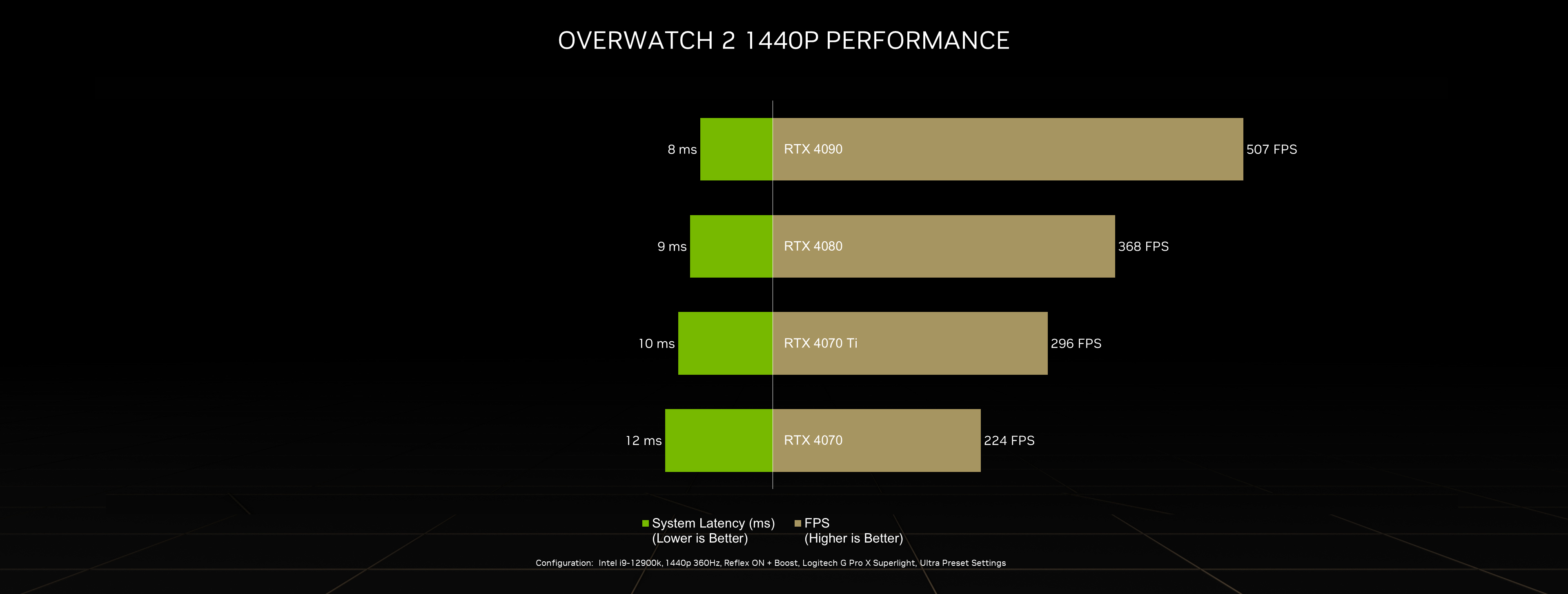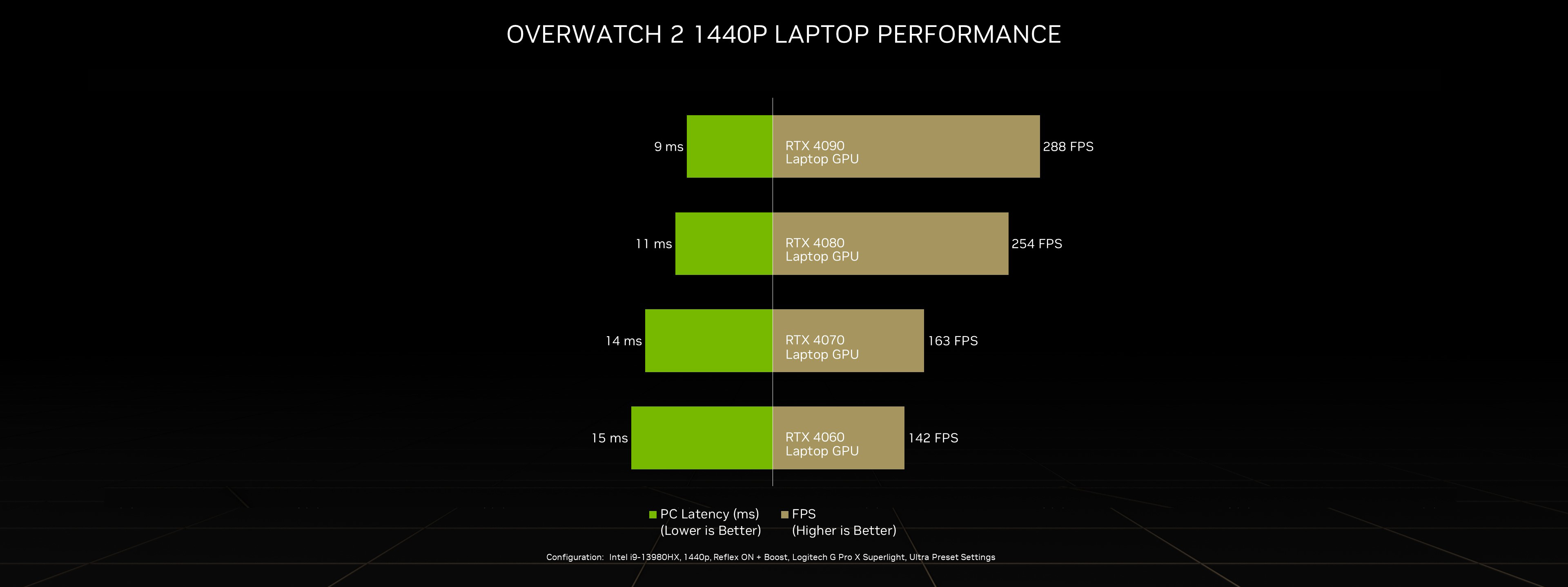THE FINALS: Out Now & Enhanced With NVIDIA Reflex, NVIDIA DLSS 3, and NVIDIA RTXGI Ray Tracing
NVIDIA Reflex is a must-have in games, reducing system latency so your actions occur quicker, giving you a competitive edge in multiplayer matches, and making single-player titles more responsive and enjoyable. NVIDIA Reflex is now used by over 50 million players each month, is available in 9 of the top 10 competitive shooters, including Counter-Strike 2, Fortnite, Call of Duty: Modern Warfare III, Call of Duty: Warzone, and is activated by 90% of GeForce gamers in over 90 supported titles.
NVIDIA Reflex is synonymous with responsive gaming, and can be found in the latest and greatest games. Since our last update, RoboCop: Rogue City, THE FINALS, and THRONE AND LIBERTY have all launched with support, and the latest seasons of your most played games are enhanced with Reflex, including Call of Duty: Modern Warfare III and Call of Duty: Warzone Season 1, Diablo IV: Season of Blood, Fortnite: Chapter 5, and Overwatch 2: Season 8.
Read on for all the details.
THE FINALS Is Out Now & Plays Best On GeForce RTX
Embark Studios’ THE FINALS is a free-to-play shooter set in a highly destructive world, making each match unique. Players form teams of three and enter tournaments that see the lowest-ranked teams dropped, concluding with a one-on-one grand finale for the title of champion. The goal is to collect, carry, and bank boxes of cash - the team with the most cash at the end of the round wins. But team wipes and steals see the pendulum of success swing widely from moment to moment, putting contestants on the edges of their seats each and every match.
Yesterday evening at The Game Awards, THE FINALS was launched on Steam in a surprise announcement, giving gamers instant access to environments that can be blown apart by explosives and an arsenal of weapons. As buildings are blown open, and walls come crashing down, the world’s lighting needs to react realistically as light is occluded or disoccluded. To make this a reality, NVIDIA RTXGI is used to accurately calculate and update light and shadow in real-time on all platforms.
With a GeForce RTX GPU in your PC or laptop, RTXGI can leverage hardware-accelerated ray tracing to produce richer and more realistic global illumination effects. When enabled, you’ll experience light realistically bouncing around the environment, reacting to destruction, and interacting with volumetric fog and smoke. And light and shadow will look even better.
To ensure frame rates stay high in this fast-paced shooter, GeForce RTX 40 Series gamers can activate NVIDIA DLSS 3 Frame Generation, and all other GeForce RTX players can enable DLSS 2 Super Resolution.
Using DLSS 3, performance multiplies, with ray tracing and all other settings maxed out. To make gameplay even more responsive in THE FINALS, all GeForce gamers with GPUs dating back to the GTX 900 Series can enable NVIDIA Reflex, which reduces system latency by up to 57%.
With Reflex, DLSS, and hardware-accelerated ray tracing, GeForce RTX gamers will receive the definitive experience in THE FINALS. See for yourself in our new frag video, leveraging all three technologies to deliver the best gameplay possible:
Download THE FINALS on Steam, and install our new Game Ready Driver to further optimize gameplay.
Call of Duty: Warzone Adds DLSS 3, Modern Warfare III Pre-Game Full Ray Tracing; Reflex Supported In All Modes
On December 6th, Season 1 for Call of Duty®: Modern Warfare® III and Call of Duty®: Warzone™ went live. Tons of new in-game content was introduced, Call of Duty: Modern Warfare III and Warzone lobbies added full ray tracing to enhance the appearance of your loadout, characters and vehicles, and Call of Duty: Warzone added support for DLSS 3, following its addition to all other modes and campaigns.
In Call of Duty: Warzone, the free-to-play massive combat arena title, players can now deploy to Urzikstan, the game’s newest big map, which is sure to excite veterans and newcomers alike. This high-density urban layout has exciting points of interest, and players can move through this city landscape with the return of slide cancel, as well as more responsive movement allowing for faster-paced play. With exhilarating new features such as the Drivable Train, Horizontal Ziplines, new Gulag map, and gameplay features, it’s time to call up the squad and drop in.
For GeForce RTX 40 Series gamers, Season 1 sees the debut of NVIDIA DLSS 3 in Call of Duty: Warzone, multiplying performance. GeForce RTX 20 Series and 30 Series gamers can boost performance with DLSS 2 Super Resolution.
And if performance is high enough already in your opinion, you can instead enable NVIDIA DLAA, an AI-based anti-aliasing mode that utilizes the same technology developed for DLSS. DLAA uses a native resolution image to maximize image quality, rather than boosting performance, for an even richer, more detailed experience.
Additionally, all GeForce gamers, dating back to users of the GeForce GTX 900 Series, can activate NVIDIA Reflex.
In Call of Duty: Warzone, NVIDIA Reflex reduces system latency by up to 28%, and combined with the super fast frame rates delivered by DLSS, you can let your skill shine when competing on the battlefields of Urzikstan, Ashika Island and Vondel.
With the release of Season 1 for Call of Duty: Modern Warfare III and Call of Duty: Warzone, NVIDIA DLSS 3, NVIDIA DLSS 2, NVIDIA DLAA, NVIDIA Reflex, and NVIDIA Image Scaling are now supported in all modes, as well in every Call of Duty: Modern Warfare II mode, giving GeForce RTX gamers the definitive PC experience.
Additionally, pre-game full ray tracing has been added to Modern Warfare III and Warzone lobbies, and the Firing Range, enabling you to view your operators and loadouts in an entirely new light. All GeForce RTX gamers can activate full ray tracing via the Video options menu, and doing so will automatically enable NVIDIA DLSS 3.5 with DLSS Ray Reconstruction. Ray Reconstruction replaces hand-tuned ray tracing denoisers with a new unified AI model, elevating the image quality of ray-traced effects and full ray tracing to new heights, further enhancing detail, realism and immersion. Get all the details here.
Fortnite Chapter 5 Now Available, New Fortnite Experiences, Each Enhanced By Reflex, DLSS 2, & Ray Tracing
Fortnite’s Unreal Engine 5 upgrade brought astonishing new visuals to the world’s most popular Battle Royale. On GeForce RTX PCs and laptops, Fortnite players can boost performance using DLSS 2, gameplay is even more responsive thanks to system latency reducing NVIDIA Reflex, and ray tracing performance is accelerated significantly using the dedicated RT Cores on each GeForce RTX GPU.
Chapter 5 of Fortnite Battle Royale brings a beautiful new Island, but not all is what it seems. “The Society” is pulling the strings in secret, and they’ve taken Peely in their spite. Join “The Underground” and take down The Society’s bosses — including its most notorious boss Valeria. To help you out, take the Island’s train, modify your weapons, and use a “Ballistic Shield” while shooting a pistol. Join the fight in Chapter 5 Season 1: Underground!
Additionally, there are three new Fortnite experiences, each enhanced and accelerated by DLSS 2, Reflex, and hardware-accelerated ray tracing:
Explore vast, open worlds where the magic of LEGO® building and Fortnite collide. Collect food and resources, craft items, build shelter and battle enemies solo or team up with up to seven friends. Get creative in building and customizing your ultimate home base using LEGO® elements collected from the world around you, then recruit villagers to gather materials and help survive the night. Gear up and drop into deep caves in search of rare resources and hidden areas.
Rocket Racing is a supersonic arcade racer where players drift, fly, and boost with friends through an ever-growing selection of tracks. Rocket Racing is developed by Psyonix, the visionary team behind Rocket League, and will be available to play today in Fortnite with an E rating.
Fortnite Festival is a new music game where players can play in a band with friends or perform solo on stage with hit music by their favorite artists. Built by Harmonix, the studio behind the iconic music game Rock Band, Festival marks the beginning of music gaming in Fortnite.
THRONE AND LIBERTY Available Now With Reflex & DLSS 3
NCSoft’s THRONE AND LIBERTY is a free-to-play MMORPG that takes place in the vast open world of Solisium. You can scale expansive mountain ranges for new vantage points, scan open skies, traverse sprawling plains, and explore a land full of depth and opportunity. Adapt your fight to survive and thrive through strategic decisions in PvP, PvE, or both, as you encounter evolving battlefields impacted by weather, time of day, and other players. There is no single path to victory as you seek to defeat Kazar and claim the throne while keeping rival guilds at bay.
Yesterday, THRONE AND LIBERTY launched in Korea, with a global release following at a later date. From day one, GeForce RTX gamers have been able to accelerate performance with DLSS 3 Frame Generation and DLSS 2 Super Resolution, and further improve the responsiveness of gameplay using NVIDIA Reflex.
For updates on THRONE AND LIBERTY’s worldwide release, stay tuned to NCSoft and Amazon Games’ websites.
RoboCop: Rogue City Is Ready For Duty, Packing Reflex, DLSS 3 & DLAA
The city of Detroit has been hit by a series of crimes, and a new enemy is threatening the public order. Embody RoboCop in an all-new investigation that leads you right into the heart of a shadowy project that takes place between the RoboCop 2 and 3 movies. Explore iconic locations and meet familiar faces from the world of RoboCop, with voice work by Peter Weller, the original RoboCop who’s returned to duty in RoboCop: Rogue City.
GeForce RTX 40 Series gamers can activate DLSS 3 Frame Generation in this Unreal Engine 5-powered shooter, all other GeForce RTX players can enable DLSS 2 Super Resolution, and players with performance to spare can max out image quality with DLAA.
On GeForce RTX 40 Series graphics cards, DLSS 3 multiplies performance by an average of 2.6X at 4K, enabling players with the GeForce RTX 4070 through 4090 to play at over 60 FPS, and up to 170 FPS, with every option cranked to the max. And by activating NVIDIA Reflex, system latency is reduced by up to 52%, further improving the responsiveness of gunplay.
Diablo IV: Season of Blood Is Enhanced By Reflex
GeForce gamers can improve responsiveness in Diablo® IV by enabling NVIDIA Reflex. In the game’s latest season, Season of Blood, system latency is reduced by up to 55%—and GeForce gamers can now measure their PC Latency in Diablo IV using GeForce Experience’s Performance Overlay or FrameView.
Load your system with a GeForce RTX 40 Series GPU and you can play at up to 390 FPS thanks to DLSS 3 - together with Reflex’s improvements, you’ll have the definitive Diablo IV experience.
Counter-Strike 2 Available Now For All, Featuring NVIDIA Reflex
In case you missed the news, Counter-Strike 2 has been officially released, and we’ve worked closely with Valve to integrate NVIDIA Reflex for reduced system latency. If you’ve got a GeForce GTX 900 Series or newer GPU, you can reduce system latency by up to 35% by simply enabling NVIDIA Reflex. See for yourself in our Counter-Strike 2 frag video, where frame rates exceed 400 FPS, and latency is as low as 5.5 milliseconds:
Coupled with a GeForce RTX 40 Series GPU, gamers can hit sub 15 ms latency, which is why Counter-Strike 2 GeForce gamers have overwhelmingly adopted Reflex, with over 90% of them playing with Reflex enabled.
Activating Reflex lowers system latency, allowing you to acquire targets faster, react more quickly, and increase aim precision in Counter-Strike 2. 3kliksphilip and Shroud recently tried it out for themselves - watch their videos to hear their thoughts on how Reflex helps deliver a superior experience:
Learn more in our Counter-Strike 2 NVIDIA Reflex launch article, and further reduce your system’s latency by following our Counter-Strike 2 Reflex Steam guide.
Overwatch 2 Season 8: Call of the Hunt Available Now & Enhanced By Reflex
NVIDIA Reflex enables GeForce gamers to play with minimal system latency in Overwatch 2’s highly competitive multiplayer matches. Overwatch 2 Season 8: Call of the Hunt launched earlier this week, and headlining the season is the introduction of Mauga, a powerful, brawling Tank Hero who will tear through the competition with his incendiary and volatile chainguns.
Mauga features a kit that is designed to bash through the front lines and brawl with his opponents in close-quarter combat, by wielding two powerful chainguns that can either be fired individually or in unison. Ignite enemies with his Incendiary Chaingun “Gunny” to burn them when they take enough damage, then finish them with a critical hit from his Volatile Chaingun “Cha-Cha.” Paired with his Berserker Passive ability, which grants Mauga temporary health whenever he deals critical damage, he’s a mountain on the battlefield.
Mauga’s not just a leading star—he also brings a host of new abilities to support his team as well. Mauga can break his way through the front lines with Overrun, a charging ability that cannot be stopped by any crowd control abilities, and stomps into opponents dealing a powerful knockback. When the fight gets intense for his team, he has Cardiac Overdrive to engage both of his hearts and create an aura that reduces incoming damage and allies to heal themselves while dealing damage.
Finally, when he really wants to tango up close with his foes, Mauga can unleash Cage Fight, his Ultimate ability. Cage Fight traps nearby opponents in a cylindrical fighting ring. This barrier blocks enemy incoming damage or healing from the outside, forcing those trapped inside to face Mauga with Gunny, Cha Cha, and a barrage of infinite ammunition. If you can’t take him down quickly, the last thing you might see is his charming smile.
Using NVIDIA Reflex on a GeForce RTX 40 Series GPU, your actions have improved responsiveness in Overwatch 2 Season 8, occurring virtually without delay, and performance is so high that you’ll see the action at its best with maximum clarity.
Activate NVIDIA Reflex now and in all future seasons of Overwatch 2 to give yourself the best chance of success.
More To Come Soon
Even more new NVIDIA Reflex games, plus Reflex-compatible mice and monitors are on their way, so stay tuned to GeForce.com to learn more when the news drops; check out the complete list of currently supported games and devices on our NVIDIA Reflex website.


